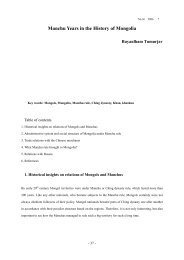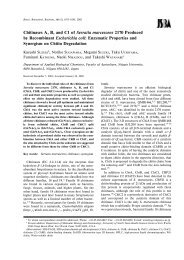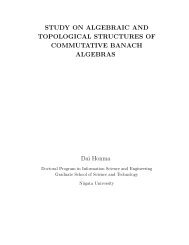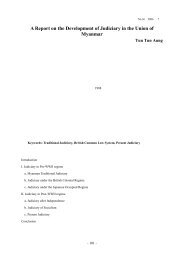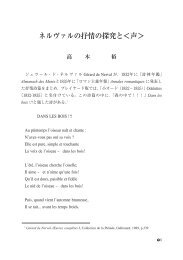An Overview of the Albanian History:
An Overview of the Albanian History:
An Overview of the Albanian History:
You also want an ePaper? Increase the reach of your titles
YUMPU automatically turns print PDFs into web optimized ePapers that Google loves.
No.34 2005 12 <br />
Khrushchev's wish to make Albania primarily an agricultural producer 63 . Moscow responded by canceling aid<br />
programs and lines <strong>of</strong> credit for Albania, but <strong>the</strong> Chinese again came to <strong>the</strong> rescue.<br />
After additional sharp exchanges between Soviet and Chinese delegates over Albania at <strong>the</strong> Communist Party<br />
<strong>of</strong> <strong>the</strong> Soviet Union's Twenty-Second Party Congress in October 1961, Khrushchev lambasted <strong>the</strong> <strong>Albanian</strong>s<br />
for executing a pregnant, pro-Soviet member <strong>of</strong> <strong>the</strong> <strong>Albanian</strong> party Politburo, and <strong>the</strong> Soviet Union finally<br />
broke diplomatic relations with Albania in December. Moscow <strong>the</strong>n withdrew all Soviet economic advisers<br />
and technicians from <strong>the</strong> country, including those at work on <strong>the</strong> Palace <strong>of</strong> Culture, and halted shipments <strong>of</strong><br />
supplies and spare parts for equipment already in place in Albania. In addition, <strong>the</strong> Soviet Union continued to<br />
dismantle its naval installations on Sazan Island, a process that had begun even before <strong>the</strong> break in relations.<br />
Communist China again compensated Albania for <strong>the</strong> loss <strong>of</strong> Soviet economic support, supplying about 90<br />
percent <strong>of</strong> <strong>the</strong> parts, foodstuffs, and o<strong>the</strong>r goods <strong>the</strong> Soviet Union had promised. Beijing lent <strong>the</strong> <strong>Albanian</strong>s<br />
money on more favorable terms than Moscow, and, unlike Soviet advisers, Chinese technicians earned <strong>the</strong><br />
same low pay as <strong>Albanian</strong> workers and lived in similar housing. China also presented Albania with a<br />
powerful radio transmission station from which Tirana sang <strong>the</strong> praises <strong>of</strong> Stalin, Hoxha, and Mao Zedong for<br />
decades. For its part, Albania <strong>of</strong>fered China a beachhead in Europe and acted as Communist China's chief<br />
spokesman at <strong>the</strong> UN. To Albania's dismay, however, Chinese equipment and technicians were not nearly so<br />
sophisticated as <strong>the</strong> Soviet goods and advisers <strong>the</strong>y replaced 64 . Ironically, a language barrier even forced <strong>the</strong><br />
Chinese and <strong>Albanian</strong> technicians to communicate in Russian. <strong>Albanian</strong>s no longer took part in Warsaw Pact<br />
activities or Comecon agreements. The o<strong>the</strong>r East European communist nations, however, did not break<br />
diplomatic or trade links with Albania. In 1964 <strong>the</strong> <strong>Albanian</strong>s went so far as to seize <strong>the</strong> empty Soviet<br />
embassy in Tirana, and <strong>Albanian</strong> workers pressed on with construction <strong>of</strong> <strong>the</strong> Palace <strong>of</strong> Culture on <strong>the</strong>ir own.<br />
The shift away from <strong>the</strong> Soviet Union wreaked havoc on Albania's economy. Half <strong>of</strong> its imports and exports<br />
had been geared toward Soviet suppliers and markets, so <strong>the</strong> souring <strong>of</strong> Tirana's relations with Moscow<br />
brought Albania's foreign trade to near collapse as China proved incapable <strong>of</strong> delivering promised machinery<br />
and equipment on time. The low productivity, flawed planning, poor workmanship, and inefficient<br />
management at <strong>Albanian</strong> enterprises became clear when Soviet and East European aid and advisers were<br />
withdrawn. In 1962 <strong>the</strong> <strong>Albanian</strong> government introduced an austerity program, appealing to <strong>the</strong> people to<br />
conserve resources, cut production costs, and abandon unnecessary investment 65 .<br />
In October 1964, Hoxha hailed Khrushchev's fall from power, and <strong>the</strong> Soviet Union's new leaders made<br />
overtures to Tirana. It soon became clear, however, that <strong>the</strong> new Soviet leadership had no intention <strong>of</strong><br />
- 259 -



